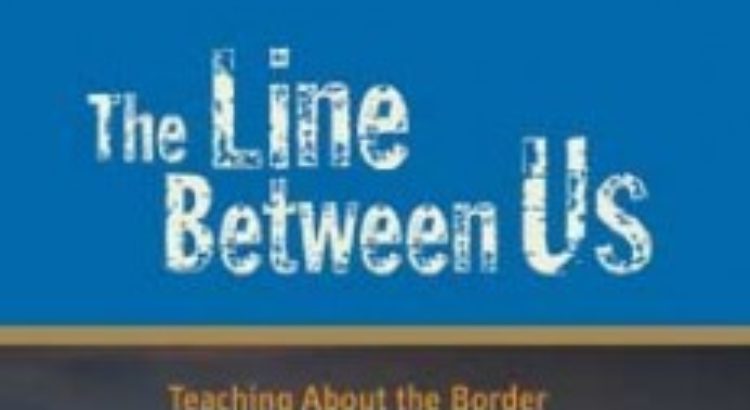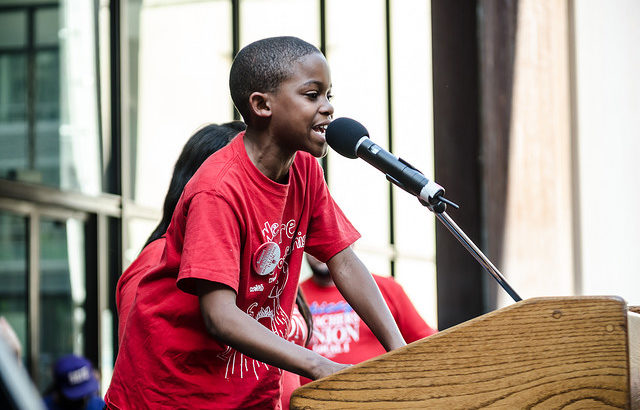By Kelly Moser
Written in 2006 and published by the teacher-led Rethinking Schools organization, The Line Between Uscontinues to be an excellent resource for teachers who address border issues in the classroom.
Beginning with a personal narrative, author Bill Bigelow provides us with a teacher-friendly book to assist students in understanding complex issues related to immigration and globalization. He offers teachers concrete strategies, lesson ideas, and resources that force students to engage in critical debate and to reconceptualize the unnecessary ‘us’ and ‘them’ dichotomy.
Unlike many teacher-oriented texts, the author chronicles his successes and failures as a teacher who strives to challenge learners’ preexisting beliefs about Mexico, the border, and immigration.
Although I am not a teacher of social studies, as a language teacher and teacher educator, I can easily identify the strengths of this particular book. Since students often hold preconceived notions about other cultures, peoples, and nations, it is my opinion that this book can be used effectively in the social studies classroom to promote empathy and social action, and to encourage an ongoing, critical dialogue.
Further, teachers in other content areas, such as foreign languages, will be able to incorporate several of these firsthand accounts and other resources to provide students with a glimpse into how other peoples live, the challenges they face, and the variety of reasons that they choose (or are forced) to come to the United States.
Teacher-friendly
First and foremost, the author allows all readers to visualize how the lesson unfolds in its entirety. Lesson examples begin with a hook, often in the form of questions intended to identify students’ background knowledge and beliefs. These opening sets are then followed by detailed step-by-step procedures to guide the teacher from beginning to end. All accompanying materials such as role play cards, external readings (political speeches, poems, personal narratives), and others are included as well.
Strategies Independent of Content Area
As an experienced teacher, I was most impressed with the numerous strategies to motivate and engage students. The author included opportunities for collaborative learning, problem solving, and debate. Among the ideas that stand out from the text are the following:
Tea Party — The tea party event is used to introduce students to a variety of historical and imaginative (yet historically appropriate) characters. At the party students receive a character card, and they become the character in order to answer classmates’ questions about a variety of issues.
Role Play — One of the role plays in this text allows students to consider four policy proposals: Proposition 187, the Extension of the Wall Between Mexico and the United States, the Legalization of Immigration from Mexico, and the Abolishment of NAFTA. Students are provided with resources to assist them in considering the implications of each policy with regard to the government, its citizens, the economy, and the environment.
Interior Monologue — The interior monologue requires learners to write from another’s perspective from the first person. Through this activity, students assume the role of another which may foster empathy and a greater understanding of the issues that impact that particular literary or historical figure.
Us and Them
Bigelow includes a variety of tasks that require students to think outside of the box. Through these activities, students begin to recognize the interconnectedness of all beings and to “regard themselves as part of a broader human family” (p. 84). They also begin to understand how politics contribute to several pervasive problems such as poverty, a widening gap between the haves and the have-nots, strict immigration laws, and environmental issues.
Most important, the lessons in The Line Between Us provide students with a more nuanced perspective, one built on a crucial balance between historical inquiry and personal anecdotes. It is perhaps this fundamental component that facilitates the connection of such complex issues to students’ unique lives.
Kelly Moser is an Assistant Professor in the Department of Curriculum, Instruction, and Special Education at Mississippi State University. Kelly coordinates the undergraduate foreign language education program, which prepares prospective teachers of Spanish, French, and German. She teaches courses related to foreign language methodology, secondary education, curriculum development, and technology integration. Her research focuses on foreign language teacher preparation and certification, using literature to promote empathy and technology in the world language classroom.








 Users Today : 15
Users Today : 15 Total Users : 35460507
Total Users : 35460507 Views Today : 36
Views Today : 36 Total views : 3419394
Total views : 3419394